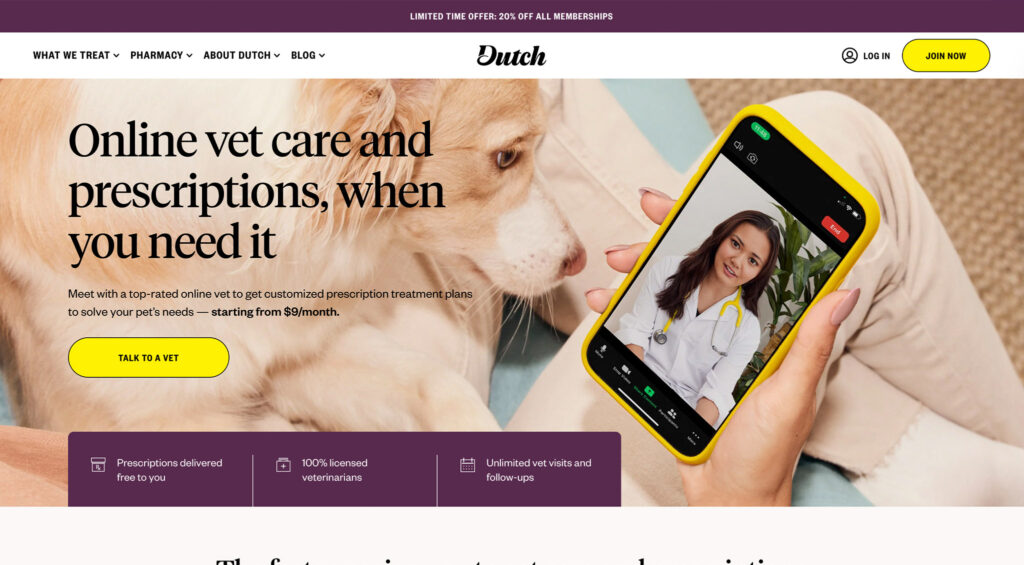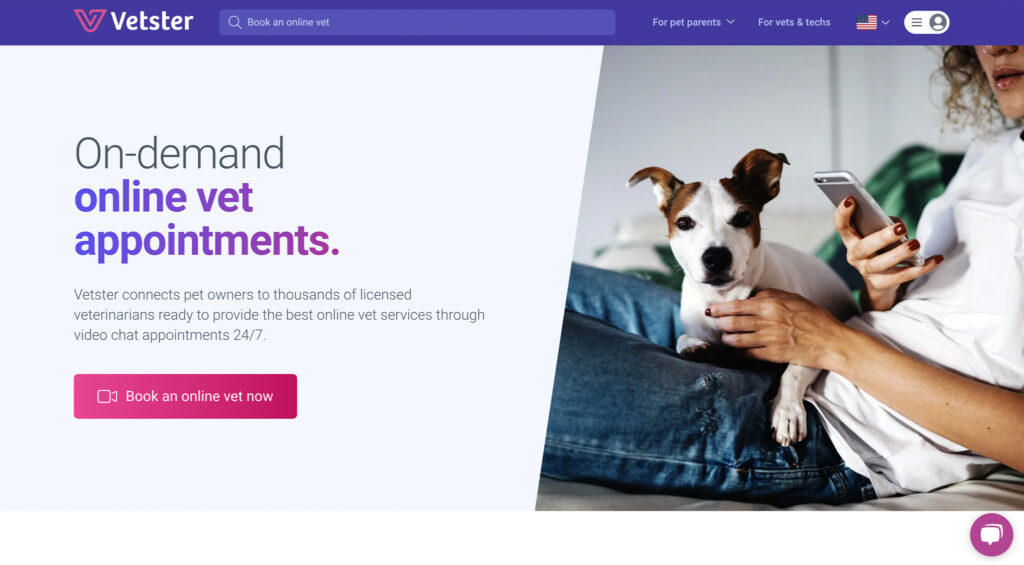In our interconnected world, telehealth services have taken off as a new standard for medical providers. Breakthroughs in virtual technology have more and more clients choosing to stay home. Veterinary telehealth is more relevant than ever.
Telehealth may seem like a daunting change, but new services make online care painless and easy. Online prescribing is all about convenience, efficiency, and client satisfaction. With telehealth, clinics can increase their client base, cut costs, and increase revenue. Telehealth also helps improve work-life balance by providing relief to high-traffic clinics. And of course, clients will be grateful for the ease of access to their vet. Let’s take a look at how telehealth and telemedicine can help improve your practice.
What are online vet prescriptions?
Telehealth providers can offer many different services. Telehealth is the general word for virtual treatment, but there are other terms to keep in mind as well:
- Telemedicine: virtual medication prescribing. Also called e-prescribing.
- Teletriage: remote patient assessment to determine care needs and urgent referrals
- Telemonitoring: remote observation of a patient via cameras or other data
- Teleconsultation: remote advising between consulting and attending veterinarians
- Teleadvice: generic advice delivered from vet to client through virtual technology
In many ways, telehealth works like in-person care. With flexible digital scheduling, clinicians have greater freedom in their schedules. Virtual visits are scheduled easily alongside in-person visits. These appointments are conducted via video call, phone call, or other virtual methods. During a virtual appointment, a client and their pet can meet with their vet on camera. The vet can then advise the client and answer questions just as in a face-to-face consultation.
In telehealth, vets can offer assessments, follow-up care, prescription services, and general advice. With telemedicine services, vets can also prescribe non-controlled medications. Not all medications are available to prescribe online. Common medications such as antibiotics and flea, tick, and heartworm preventatives are available.
To prescribe online, certain legal requirements must be met. Most importantly, vets must establish VCPR (Veterinarian-Client-Patient Relationship) before prescribing medications online.
To establish VCPR, the veterinarian must take full responsibility for a patient’s care and well-being and keep full records of care. These requirements vary in detail depending on the state. VCPR can be established online in 33 states. If your state does not allow VCPR to be established online, an in-person appointment must be conducted before prescribing. Depending on the patient’s needs, clients may need to visit their veterinarian in-person first. This is important when prescribing for conditions that require tests or examinations that cannot be conducted online.
VCPR Laws by State
| VCPR laws | States |
|---|---|
| States allowing virtual VCPR establishment | Idaho, Michigan, Oklahoma, New Jersey, Virginia |
| States with time limits on VCPR validity | Alaska, Oregon, South Carolina, West Virginia, Georgia, Tennessee, Washington, Florida, Idaho |
| States allowing telemedicine VCPR, except for prescription drugs | Florida |
| States with prescriptions exception for opioid/controlled substance via telemedicine | New Jersey, Virginia |
| States where VCPR can not be established via telemedicine | California, Mississippi, Texas, Utah, Illinois, Connecticut, Georgia, Tennessee, Washington, Nevada |
| States requiring physical examination for VCPR establishment | Alabama, Arkansas, District of Columbia, Hawaii, Kansas, Kentucky, Maryland, Minnesota, Missouri, Montana, North Carolina, North Dakota, Nebraska, New Hampshire, New Mexico, Ohio, Pennsylvania, Vermont, Wisconsin, Wyoming, Connecticut, Alaska, Oregon, South Carolina, West Virginia, Nevada |
| States with “Seen/Acquaintance With” requirement for VCPR | Arizona, Colorado, Indiana, Louisiana, Maine, Rhode Island, South Dakota |
| States with COVID-19 VCPR changes | Iowa, Illinois |
| States with undefined VCPR | New York |
Why choose telehealth?
With telehealth, clients and patients can receive quality care without leaving their home. Online appointments are more comfortable for the pet in cases of mobility issues or clinic anxiety. Clients can also breathe easier when they need fast advice or do not have easy access to a clinic. This is particularly helpful with exotic pets when exotic care practices are not nearby.
With telemedicine, medications are prescribed and delivered completely online. This makes prescribing extremely easy and convenient for both the vet and the client.
The convenience and comfort of telehealth is also a great way to streamline a practice. Online services increase the client base and allow practices to see more patients on a day-to-day basis. The convenience of telehealth is especially helpful in remote areas without easy access to clinics. The relief provided by online appointments can also reduce workplace stress and burnout. Many companies already offer virtual veterinary services, including Dutch, Vetster, and Hello Ralphie. These services function as full virtual clinics and make it easy for vets to see patients online.
Dutch

Website: https://www.dutch.com/
About: Dutch makes high-quality veterinary care available 24 hours a day. They offer a convenient approach to veterinary care by utilizing telehealth solutions to connect pet owners with veterinarians. They prescribe medically approved treatments and medications that are tailored to individual cases and these are delivered straight to your door.
Vetster

Website: https://vetster.com/en-us
About: Vetster is an online platform that links pet owners to thousands of licensed veterinarians, who are available 24/7 to offer veterinary care through video chat appointments. This affordable, comprehensive pet care solution promotes proactive pet health care worldwide. Vetster’s range of communication options includes video, text, and voice chat, ensuring that pet owners can access the care they need in a way that suits them best.
Hello Ralphie

Website: https://helloralphie.com/
About: Hello Ralphie provides virtual veterinary care for pets, allowing pet owners to receive care for their furry companions without leaving home. Their services cover a range of animals, from cats and dogs to pocket pets, exotic animals, and large animals.
Telehealth is a great way to expand the scope of a clinic. These services can significantly increase revenue and reduce costs without compromising quality of care. The convenience of online care improves client satisfaction and compliance. The comfort of asking questions from home allows clients better resources for quick care.
How to implement online prescription services
Implementing telehealth services at a practice is easier than ever. Clinics can sign up for telehealth services through provider websites. Individual clinicians can also register to start practicing online immediately.
Before signing up, clinics should take stock of their current capabilities. Telehealth is most effective when using high-quality microphones and cameras and up-to-date software. Make sure your clinic has a quiet, secure space to conduct telehealth appointments. Customer service representatives should also learn to recognize when telehealth may be the best choice for a client.
Telehealth is not meant to replace in-person care, but to provide support and relief. Providers integrate their services into apps that make it easy to sign up as a clinic or individual practitioner. These companies take care of everything from scheduling to prescribing, and in some cases even handle client payments.
When preparing for a virtual visit, vets should keep in mind what clients need ahead of the appointment. To ensure high-quality care, clients should know their pet’s current symptoms. Vets may ask clients to also prepare medical history, documents, photos, videos, and timelines relevant to their pet’s treatment needs. This may include sending photos or other information to a vet ahead of the appointment. After an appointment, telehealth providers can assist vets in creating treatment plans for the pet.
Ensure your client has the information they need to be comfortable in a virtual setting. This includes educating clients on using the virtual platform as well as basic info such as pricing and appointment length. Clients should be aware of the limitations of telehealth as well. There are many services vets can provide online, but only so much can be done via computer.
While telehealth is a remarkable breakthrough in medicine, there are still legal and ethical concerns to keep in mind. As mentioned above, VCPR must be established before any medications can be prescribed online. Not all medications are available to prescribe virtually. Clinicians should check their state’s VCPR requirements before attempting to prescribe online. Telemedicine should be used responsibly as a tool of the practice rather than a catch-all method of treatment.
Vets should also be cautious when providing specific treatment virtually. While giving general advice is generally low-risk, treating specific issues can be difficult over a computer.
Conclusion
The veterinary medicine field is always changing, updating, and moving. In a post-COVID world, vets and other practitioners are learning that business as usual has changed fundamentally. Online integration seems to be the present and future of the medical industry. But there is no reason to be alarmed or concerned at this shift in the status quo. Telehealth companies provide vets with the opportunity to change the way they do business without risking the identity of their clinic or quality of care.
Quick and painless online care is becoming essential to pet owners across the country. The benefits are undeniable — who doesn’t want to stay at home with their sick pet, especially when a clinic may be inconvenient to visit? The freedom to contact clients instantly also allows more opportunities to provide high-quality care and attention.
Telehealth also provides much-needed relief to practitioners in high-stress conditions. In an industry with high stress and burnout, online services are a smart way to improve work-life balance.
Telehealth services also make clinics more competitive in a rapidly changing market. More businesses adopt online integration every day, and veterinary medicine is no exception. Online services make a clinic more visible and accessible to a wider client base.
Using telehealth at your practice can cut costs and increase revenue with minimal disruption. The services described above are designed to improve client experiences and workplace efficiency.
Want to find more of our publications that are related to veterinary technology questions? Check our Learning Center.

